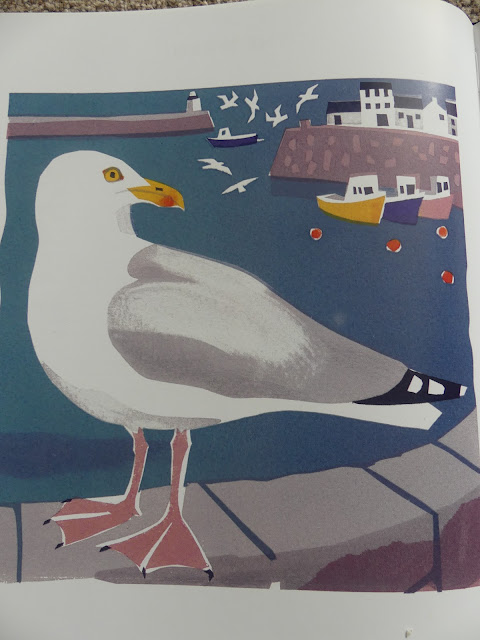I'm seeing several gulls - too far away to see exactly what sort- from my front windows this summer due to the building work going on on the far side of the burial ground. They dug out a lot of soil to make a level spot for the two bungalows by the road and heaped it up along the edge. Now it's being levelled over all the rest of the large site behind where the bungalows have been started. Gulls are very fond of newly turned earth.
The Herring Gull. Illustration from 'A Sparrow's Life's as Sweet as Ours by Carrie Ackroyd.
Each bird illustration has a page of information written by John McEwen. Herring Gulls have a wingspan of up to 5¼ feet and up until the second half of the 20th century were usually to be found by the sea. Lack of fish made them move inland and become a problem in many places where they often make newspaper headlines by stealing food from peoples picnics and violently excreting what they've just eaten when angry.
Apparently numbers have halved since the 1970s and they were Red Listed because of their rapid decline.
The photo below is from the time we had a beach hut at Felixstowe for a couple of years when Colin was poorly.
 |
Back Tomorrow
Sue

If I stretch out my arms I have a span of 5 feet. I didn't realise herring gulls could be that big!
ReplyDeleteNow off to measure my wingspan!
DeleteYour wingspan is roughly your height, if that helps!
DeleteWell over 150cms - that's big, isn't it? A shame they have been driven inland from their normal environment. xx
ReplyDeleteIt’s all about the geese here as they begin to return to our wetlands for the winter. I saw a beautiful formation flying above the river just after sunrise this morning. Visiting Pulborough Brooks RSPB nature reserve this week we heard that the pair of White Tailed Eagles had returned and that storks from nearby Knepp had been seen too. These are big birds. One of the birders had photographed one of the eagles in flight that morning and showed us his photograph - their wings are so huge they they really do look like barn doors! Sarah in Sussex
ReplyDeleteRarely see geese here in Mid Suffolk except on a few lakes which were once sand/gravel pits.
DeleteI live on the coast and often see herring gulls outside my house and I sometimes see them doing a little dance in the grass hoping to bring worms to the surface.
ReplyDeleteThey have quite big feet too
DeleteI had forgotten about their dancing to bring up worms, once seen it makes you laugh.
ReplyDeleteI'd forgotten too
DeleteYou would never know their numbers have diminished if you visit the beachs here there are a lot of them.
ReplyDeleteCathy
I was surprised to read they have declined so much too
DeleteThere are a number of gulls around here, too, but they don't settle nearby so I haven't been able to identify them.
ReplyDeleteWe call them all sea gulls when really there is no such thing!
DeleteThey are alive and well and in large numbers along the north shore of Lake Superior, where I grew up. Just as happy to find a chip from the trash can, or to fish in the water--but always a lovely sight as they fly out over the water. Ours are quite vocal, too.
ReplyDeleteBonnie in Minneapolis
We always thought it was rough out at sea if we saw them inland but now they are everywhere
DeleteI don't see as many gulls on my lake as I used to and that makes me sad as I've always loved them. They're still there -- but definitely many less than in years before. (On the other hand, go to the grocery store parking lot and you'll see more than a few!)
ReplyDeleteThey follow the food!
DeleteSeagulls are quite lovely to watch when at the shore. They also follow fishing boats hoping to get a meal. During a storm they seem to stand high facing the sea surge. When they migrate inland, they become scavengers and not very well liked. I also like the little sandpipers as they run along a sandy beach following the tides lapping the shoreline.
ReplyDeleteThey are messy things when inland and scrounging from waste bins
DeleteMost likely they are Herring Gulls. Black Back Gulls do have a distinctive black back. I know they are deemed a nuisance, but they are quite handsome birds.
ReplyDeleteBig ol' birds for sure!
DeleteThat's a very fine illustration of a Herring Gull - and your photo's not too shabby either! Identifying gulls is one of those things that the more you study it the more difficult you realise it is!
ReplyDeleteWhich is probably why we just call them Seagulls!
Delete